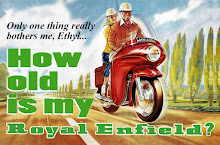 |
| Prototype Royal Enfield 800cc parallel twin motor. (Allan Hitchcock Photo) |
The 1969 tests were run by factory rider Richard Stevens. The test bike now belongs to British racer Steve Linsdell. Allan Hitchcock of Hitchcocks Motorcycles Ltd. has put another prototype 800cc motor into the frame of a Royal Enfield twin.
It is a fascinating footnote to Royal Enfield history. It's one that Royal Enfield enthusiast Chris Overton, of Canada, has studied. Chris was kind enough to allow me to share an email with some of what he has learned:
"The 800 had a number of features to deal with the issues developing as the 700 twin was developed to its limits. The rocker tips had swivels so a flat surface contacted the valve tips, overcoming the limitations on valve train geometry imposed by keeping the engine height within reason (22 inches is tall!).
"Previous 700 and 750 twins have difficulty with the valve stem tips becoming pocketed from point contact with the rockers. This allowed the rocker to transmit lateral forces to the valve with wear consequences to valve stems and guides. The 800 could then have thinner valve stems for better flow through the ports.
"Another weak link was the clutch, designed decades earlier for smaller engines. The splined clutch resulted (and, although never put into production Series II Interceptors, it was available for retrofit). Ignition was electronic, with an early Boyer-Bransden system.
"I have had several conversations with Richard Stevens, the factory test rider who put so many miles on the prototype, and a visit with Steve Linsdell when I went to his shop in Flitwick, UK to see the 800.
"It is notable that both repeatedly use the terms 'quick' and 'right' when describing the 800’s performance. Both riders are using English understatement in the extreme. When questioned on the details, it seems both felt everything in the engine design came together. There were no issues such as 'peaky' power bands or temperamental tuning. Power delivery was strong and consistent — 128 mph from the 800 is consistent with 115 mph with a 750.
"There is more to winning than peak horsepower and max speed. Two experienced racers felt the 800 was especially quick because the engine was right.
"Richard can hardly contain himself when describing the 128 mph first test run of the 800. The Triumph team were at the MIRA track too and could not help but notice the 800’s performance, and potential for more. Richard struggles to maintain his polite, understated ways, and beams describing what I take to be surprise and competitive concern from the heavyweight competitor."
Chris concluded this way:
"The 800 would have been a contender, and Enfield could have done alright with it. If another 800 engine should turn up, I have a spare frame here...."
































I would love a relaunch of this model...Hope R.E INDIA gets it back...
ReplyDeleteIf so, it is England who should make it.
ReplyDelete